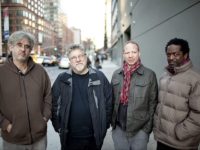The Penguin Guide to Jazz On CD (Fourth Ed., Cook and Morton) opined back in the 90s that the Polish trumpeter Tomasz Stanko is an artist first and foremost and a musician second, asserting that “he is a man whose imagination is fired as much by words…as by music.” Stanko gets fired up by the words of a fellow Pole, the Nobel Laureate poet Wislawa Symborska, even formulating trumpet improvisations inspired by a reading she once gave at the Krakow Opera. Stanko got inspired again at Symborska’s passing in early 2012 at the age of eighty-eight, and just months later had recorded a new set of material in her honor. The name of this album, coming barely thirteen months after her death, is called Wislawa.
Not knowing this background hardly hinders enjoyment of this music, however. Stanko himself is seventy years old, but the living patriarch of modern Polish jazz has assimilated the style and approach from the younger and most vibrant jazz performers of New York, where he now calls home as much as Warsaw, and drinking from that scene like it’s the fountain of youth. It’s with three of these shining examples of the scene that he’s put together an ensemble that gives life to his tribute to Symborska.
Stanko must have felt deeply pleased with either his material or his bands — or most likely, both — because Wislawa spans over two CD discs, a rarity these days for studio recordings. The hour and forty minutes of new music has the feel of a refined jam session, but with purpose. Motifs are typically announced at the beginning of performances by Stanko and pianist David Virelles, before they diverge into the song’s different harmonic components. Double bassist Thomas Morgan occupies another harmonic space toward the lower end of things, but his range makes him capable of pleasant surprises. Gerald Cleaver, a world-class elite drummer capable of excelling in any setting of every stripe of jazz, flourishes here by straddling the line between time keeping and discreet, freeform tonal modulations.
Stanko himself resides in a spot that’s not quite avant-garde and not quite modern jazz, but in a space that draws aspects from both. He’s often minimalist, as on the title song that begins the album, which is a lovely ballad that flows at natural pace (an alternate take, called “Wislawa, Var.,” ends the album). It’s sort of sad , and sort of hopeful. Virelles reveals himself as a master of economical emotion, but Stanko seems to be making a statement with every note. “Metafizyka” is another affecting ballad, and Stanko’s signature lonely trumpet sound especially resonates here. The song settles into an urbane groove set up perfectly by the rhythm section, and Morgan follows Stanko’s aching lead by devising an aching solo of his own. The angularity is stretched further on “Song For H,” a very spacious track where notes are scarce and Cleaver plays free, as occasional thematic phrases by Stanko and Virelles keep the song tethered. “Oni” moves like a mid-sixties Miles ballad, where Stanko’s technique is still fundamentally solid even though he’s clearly going for mood. Virelles, meanwhile, has a deft touch that takes advantage of the light swing groove of Morgan and Cleaver.
This isn’t just a ballads album, and Stanko is still capable of bringing heat. He sounds positively vital on the runaway “Assassins,” at times flirting with out jazz. “Faces” is Stanko at his most ferocious. Egged on by Cleaver, he embarks on a thrilling ride of passion peaks and valleys. As this rubato downshifts a gear, Virelles takes on a different tactic and leans on full chords for his solo.
There are other tricks employed elsewhere on the collection that proves Stanko is still able to adapt well this far into an illustrious career: Old World melodic progressions are applied to a New World swing tempo on “Dernier Cri,” and “Mikrokosmos” employs an abject South American mood with which Stanko is able to express eloquently and the Cuban Virelles is supremely qualified to exploit, and does.
The artist who happens to be a musician, Tomasz Stanko once again draws from one kind of artistry to mold art of another form. There is no slowing down for one of Eastern Europe’s all-time most important figures of jazz, and Wislawa serves to add another building block to an impressive body of work.
Wislawa is set for release on March 19, by ECM Records.
[amazon_enhanced asin=”B00AE10BD6″ /] [amazon_enhanced asin=”B002NV02SE” /] [amazon_enhanced asin=”B000GKH246″ /] [amazon_enhanced asin=”B0000V765G” /] [amazon_enhanced asin=”B00000B12G” /] [amazon_enhanced asin=”B00005YPG8″ /] [amazon_enhanced asin=”B000024TPA” /] [amazon_enhanced asin=”B000FDFF5M” /]
- Dave Douglas, feat. James Brandon Lewis – ‘Gifts’ (2024) - April 11, 2024
- Thollem – ‘Worlds In A Life, Two’ (2024) - April 8, 2024
- Oceans And [Tim Berne, Hank Roberts + Aurora Nealand] – ‘Lucid/Still’ (2024) - April 3, 2024




